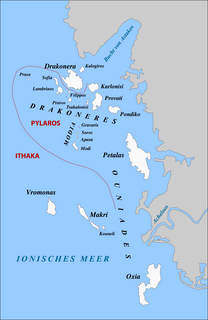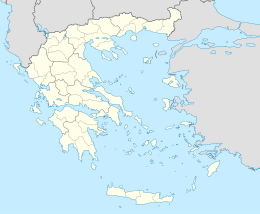
Athens is the capital and largest city of Greece. Athens dominates the Attica region and is one of the world's oldest cities, with its recorded history spanning over 3,400 years and its earliest human presence starting somewhere between the 11th and 7th millennium BC.

Cyprus, officially the Republic of Cyprus, is an island country in the Eastern Mediterranean and the third largest and third most populous island in the Mediterranean, located south of Turkey, west of Syria and Lebanon, northwest of Israel, north of Egypt, and southeast of Greece.

Crete is the largest and most populous of the Greek islands, the 88th largest island in the world and the fifth largest island in the Mediterranean Sea, after Sicily, Sardinia, Cyprus, and Corsica. Crete and a number of surrounding islands and islets constitute the region of Crete, one of the 13 top-level administrative units of Greece. The capital and the largest city is Heraklion. As of 2011, the region had a population of 623,065.
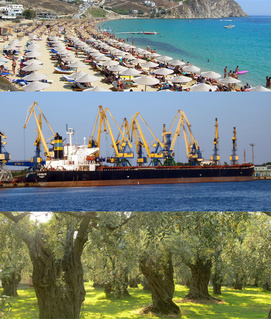
The economy of Greece is the 51st largest in the world with a nominal gross domestic product (GDP) of $200.288 billion per annum. It is also the 56th largest in the world by purchasing power parity, at $297.008 billion per annum. As of 2017, Greece is the seventeenth-largest economy in the 28-member European Union. According to IMF estimates for 2017, Greece is ranked 40th and 49th in the world at $18,637 and $27,796 for nominal GDP per capita and purchasing power parity per capita respectively.

Thessaloniki, also familiarly known as Thessalonica, Salonica or Salonika, is the second-largest city in Greece, with over 1 million inhabitants in its metropolitan area, and the capital of Greek Macedonia, the administrative region of Central Macedonia and the Decentralized Administration of Macedonia and Thrace. Its nickname is η Συμπρωτεύουσα (Symprotévousa), literally "the co-capital", a reference to its historical status as the Συμβασιλεύουσα (Symvasilévousa) or "co-reigning" city of the Eastern Roman (Byzantine) Empire, alongside Constantinople.
The Greeks or Hellenes are an ethnic group native to Greece, Cyprus, southern Albania, Italy, Turkey, Egypt and, to a lesser extent, other countries surrounding the Mediterranean Sea. They also form a significant diaspora, with Greek communities established around the world.

The Peloponnese or Peloponnesus is a peninsula and geographic region in southern Greece. It is connected to the central part of the country by the Isthmus of Corinth land bridge which separates the Gulf of Corinth from the Saronic Gulf. During the late Middle Ages and the Ottoman era, the peninsula was known as the Morea, a name still in colloquial use in its demotic form.

Ancient Greece was a civilization belonging to a period of Greek history from the Greek Dark Ages of the 12th–9th centuries BC to the end of antiquity. Immediately following this period was the beginning of the Early Middle Ages and the Byzantine era. Roughly three centuries after the Late Bronze Age collapse of Mycenaean Greece, Greek urban poleis began to form in the 8th century BC, ushering in the Archaic period and colonization of the Mediterranean Basin. This was followed by the period of Classical Greece, an era that began with the Greco-Persian Wars, lasting from the 5th to 4th centuries BC. Due to the conquests by Alexander the Great of Macedon, Hellenistic civilization flourished from Central Asia to the western end of the Mediterranean Sea. The Hellenistic period came to an end with the conquests and annexations of the eastern Mediterranean world by the Roman Republic, which established the Roman province of Macedonia in Roman Greece, and later the province of Achaea during the Roman Empire.

The Ancient Greek language includes the forms of Greek used in Ancient Greece and the ancient world from around the 9th century BCE to the 6th century CE. It is often roughly divided into the Archaic period, Classical period, and Hellenistic period. It is antedated in the second millennium BCE by Mycenaean Greek and succeeded by medieval Greek.

The Greek War of Independence, also known as the Greek Revolution, was a successful war of independence waged by Greek revolutionaries against the Ottoman Empire between 1821 and 1830. The Greeks were later assisted by the Russian Empire, Great Britain, and the Kingdom of France, while the Ottomans were aided by their North African vassals, the eyalets of Egypt, Algeria, and Tripolitania, and the Beylik of Tunis.

Sagittarius (♐) is the ninth astrological sign, which is associated with the constellation Sagittarius and spans 240–270th degrees of the zodiac. Under the tropical zodiac, the sun transits this sign between approximately November 23 and December 21. Greek mythology associates Sagittarius with the centaur Chiron, who mentored Achilles, a Greek hero of the Trojan War, in archery.

Macedonia is a geographic and former administrative region of Greece, in the southern Balkans. Macedonia is the largest and second-most-populous Greek region, with a population of 2.38 million in 2017. The region is highly mountainous, with most major urban centres such as Thessaloniki and Kavala being concentrated on its southern coastline. Together with Thrace, and sometimes also Thessaly and Epirus, it is part of Northern Greece. It also contains Mount Athos, an autonomous monastic region of Greece. Macedonia forms part of Greece's national frontier with three countries: Bulgaria to the north-east, the Republic of North Macedonia to the north, and Albania to the north-west.

Virgo (♍), is the sixth astrological sign in the Zodiac. It spans the 150-180th degree of the zodiac. Under the tropical zodiac, the Sun transits this area on average between August 23 and September 22, and the Sun transits the constellation of Virgo from approximately September 16 to October 30. Individuals born during these dates, depending on which system of astrology they subscribe to, may be called Virgos or Virgoans. The symbol of the maiden is based on Astraea. In Greek mythology, she was the last immortal to abandon Earth at the end of the Silver Age, when the gods fled to Olympus – hence the sign's association with Earth.
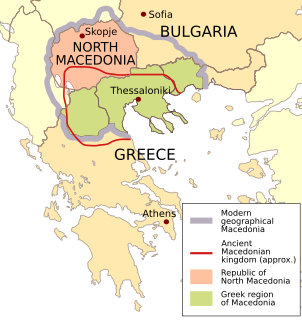
The use of the name "Macedonia" was disputed between the Southeast European countries of Greece and North Macedonia. Pertinent to its background is an early 20th-century multifaceted dispute and armed conflict that formed part of the background to the Balkan Wars. The specific naming dispute, although an existing issue in Yugoslav–Greek relations since World War II, was reignited after the breakup of Yugoslavia and the newly gained independence of the former Socialist Republic of Macedonia in 1991. Since then, it was an ongoing issue in bilateral and international relations until it was settled with the Prespa agreement in June 2018, the subsequent ratification by the Macedonian and Greek parliaments in late 2018 and early 2019, and the official renaming of Macedonia to North Macedonia in February 2019.

Georgios "Yorgos" Lanthimos is a Greek film, video and theatre director, producer, and screenwriter. As of 2019, he has received four Academy Award nominations, Best Original Screenplay for The Lobster (2015), Best Picture and Best Director for The Favourite (2018), and his film Dogtooth was also nominated for Best Foreign Language Film representing Greece.

North Macedonia, officially the Republic of North Macedonia, is a country in the Balkan Peninsula in Southeast Europe. It is one of the successor states of the former Yugoslavia, from which it declared independence in September 1991 under the name Republic of Macedonia. The country, which retained the name until February 2019 under the provisions of an agreement with neighboring Greece, was commonly known as Macedonia.
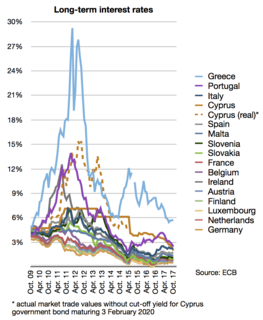
The European debt crisis is a multi-year debt crisis that has been taking place in the European Union since the end of 2009. Several eurozone member states were unable to repay or refinance their government debt or to bail out over-indebted banks under their national supervision without the assistance of third parties like other eurozone countries, the European Central Bank (ECB), or the International Monetary Fund (IMF).

The Greek government-debt crisis is the sovereign debt crisis faced by Greece in the aftermath of the financial crisis of 2007–08. Widely known in the country as The Crisis, it reached the populace as a series of sudden reforms and austerity measures that led to impoverishment and loss of income and property, as well as a small-scale humanitarian crisis. In all, the Greek economy suffered the longest recession of any advanced capitalist economy to date, overtaking the US Great Depression. As a result, the Greek political system has been upended, social exclusion increased with hundreds of thousands of well-educated Greeks leaving the country.

The anti-austerity movement in Greece involves a series of demonstrations and general strikes that took place across the country. The events, which began on 5 May 2010, were provoked by plans to cut public spending and raise taxes as austerity measures in exchange for a €110 billion bail-out, aimed at solving the Greek government-debt crisis. Three people were killed on 5 May in one of the largest demonstrations in Greece since 1973.
